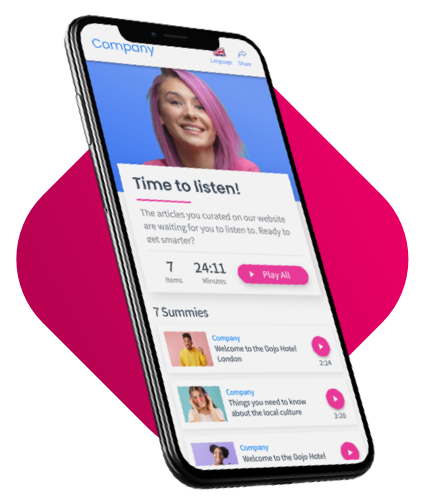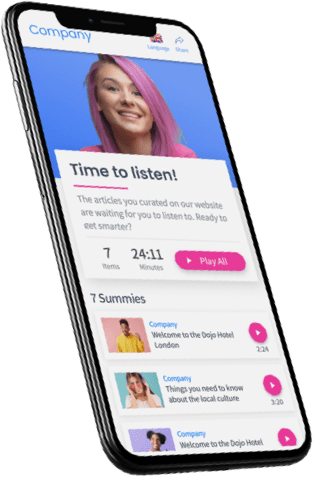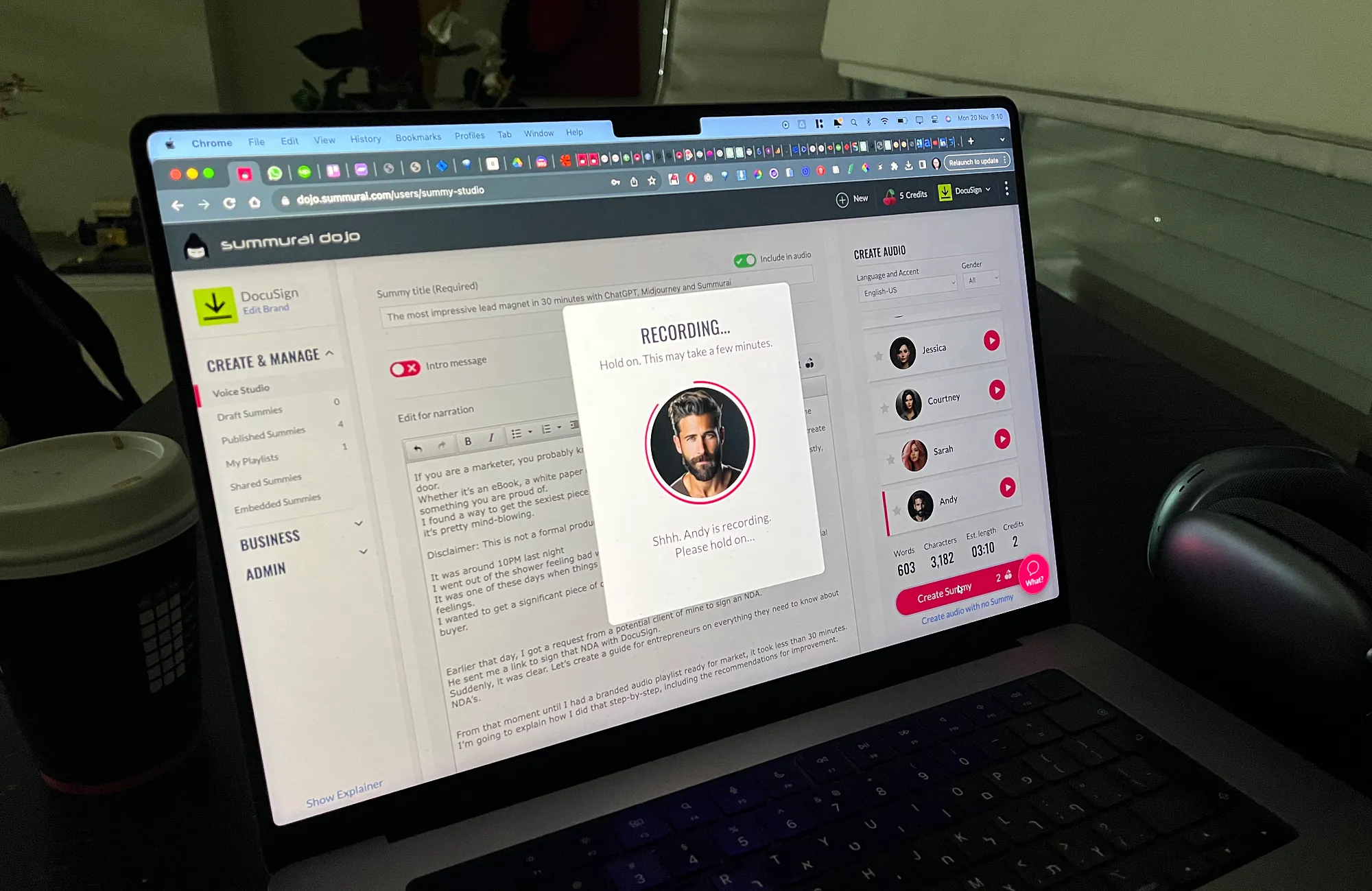It’s time for audio.
After many years of creating interactions between people and digital products in the world of UX design — seeing tremendous content overload from brands as well as content fatigue from the customer side — it’s clear to me that it’s time for something new. It’s time for audio to take its place.
No. I’m not talking about podcasts. I’m talking about a much wider concept, where audio becomes another major element we embed along the customer journey.
Audio opens the door to a new type of communication — one that is adapted to all types of devices, and which can fit into even the smallest parts of every customer’s timeline. Yet when I tell this to high-level marketers, digital managers and innovators, most of them respond with surprise.
Whenever I offer the concept of embedding audio within the customer journey, the number one comment I get is, “Audio?! Isn’t video the most effective way to push content nowadays?” It’s taken me a while to figure out the reason for this, but I think that I finally have an answer — and it all goes back to the earliest days of communication.
Evolution
Mass media started off with Johannes Gutenberg’s printing revolution back in the year 1400. It took nearly 450 years for the next medium to take shape, when German physicist Heinrich Rudolf Hertz proved the existence of electromagnetic waves and allowed for the creation of the radio. Next in line was the television, which appeared in the 1930s, offering an enhanced experienced for both our eyes and our ears.
The digital revolution was not far behind, first as text-only services, and moving to visual interfaces in 1979. Video took a while longer to appear — although internet video was already available back in 1995, it took another decade for YouTube to come along and offer online video sharing. Luckily, this came at a good time, as high-speed internet, smartphones and social media were all about to become commonplace and revolutionize the way we consume content, as well as significantly shorten our attention span.

I found out why they don’t open the door
The reason it’s so hard to realize that audio is the next big thing is that it sounds like a bit of a paradox — if we already have extensive experience with video content, it doesn’t make sense to take a step back and work on audio content.
While it’s natural to think this way, there is a simple reason why going one step back actually means taking a giant leap forward.
Video — like text-based media — requires our full attention. And in the year 2020, our full attention is way too much to ask.
The fifth disruption
Audio is the next big thing because of a simple thing that we just don’t have enough of — time.
Watching a video or reading a text means that we have to stop everything else we’re doing and concentrate on the media we’re consuming. Because of our short attention span, neither of these media has a bright future ahead of them. Audio is the only form of communication that can find its way into our heads while we are busy doing other things.
Voice is the fifth digital disruption — and yet it has only been around since 2016. If you ask digital experts what the “voice revolution” is all about, they will probably mention personal assistants and podcasting. But while both these concepts are indeed pretty innovative, most digital marketing experts don’t have much use for them. You could always start a podcast, but this will require long-term commitment and effort. If you don’t maintain the right talent, consistency and passion — your podcast will fade into oblivion pretty quickly. In addition, the ROI on podcasting is still way too vague for podcasts to be considered a valuable asset. Providing a service that integrates with personal assistants is another pretty vague idea. It sounds nice, but people who use personal assistants will be hard-pressed to make use of your content there.
This is much bigger than Alexa and podcasts
If you ask me, brands still don’t understand the real potential behind audio. It isn’t podcasting, and it isn’t integration with personal assistants. The real potential of audio is all about embedding audio within different points in time across the customer journey.
Think of all of the content your brand creates: a blog, social media posts, eBooks, whitepapers, emails, text messages… And now look at your customers’ timeline and ask yourself — at what point in their day do you expect them to dive into any of your content? Were you really expecting your audience to download and read that 15-page white-paper you produced, or open that user manual you’ve just emailed them?
Now imagine turning all this into audio. That customer who has just come across your blog post but doesn’t really want to read the entire thing — how about adding a “Send to My Phone” button to your page so that she can listen to that content later as she’s driving back home?
Consider replacing your white paper with an audio playlist, thereby allowing your customers to consume your content easily by simply hitting the ‘Play’ button on their phone. Not only will you have higher engagement, you’ll also be able to track the interaction and know exactly how engaged each customer is, allowing you to easily identify potential customers showing interest, and marking them as qualified leads.
And what about that repetitive sales pitch or after-sales instructions that your sales team has to keep repeating over and over again? What if you replaced it with an audio playlist that they could send to the customer? I’m sure your sales team would love to have more time to deal with things that actually matter.
Think of audio as a tool for keeping your team up to date. Whether it’s that product brief you want your team to hear, a message from the CEO, or a consistent way of providing your workers with audio summaries of informative online articles.
What about your blog?
Your blog posts are textual, so your audience won’t have the time to actually read them. They will discover them, browse to look at the titles and go away leaving the tab open in the best case.
Instead of that, you could give them the chance to enjoy your content later, by listening to it on the go. We call it Playter. Playter allows visitors to send the blog post to their phone and listen to it on the go.
This option helps you fit your valuable message into your customers’ busy lifestyle.
If you’d like to learn more about Playter, feel free to schedule a demo and we’ll be happy to tell you more.
How does that sound?

Tal Florentin
Add Playter to your blog
and turn visitors into leads.
Let your visitors listen to your content
Recent posts
MEET OUR STORYTELLERS
Get ready to create your storyteller
We're super excited to finally launch Summurai Storytellers.
Turn your blog posts to podcast with AI and Summur
How to turn your blog posts into audio and load them to the leading podcast platforms
Outstanding Audio Lead Magnet in 29 minutes with C
The challenge of creating significant content
Sushi Philosophy: Think Sushi and Embrace the Summ
When it comes to lead generation and content marketing, finding the perfect balance between engaging your audience and delivering valuable information
The Open Tab Trap is killing your funnel
How Content Consumption Habits Impact Your Marketing Funnel?
In the digital age, content
How to send voice messages on WhatsApp without ann
Why do we hate receiving WhatsApp voice messages, how do you make WhatsApp voice messages super effective and how you can use them in your marketing c
History is killing the future of audio experiences
I finally figured out what they consider audio a thing of the past.
















